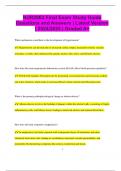NUR2063 Final Exam Study Guide
Questions and Answers | Latest Version
| 2024/2025 | Graded A+
What mechanisms contribute to the development of hypertension?
✔✔ Hypertension can develop due to increased cardiac output, increased systemic vascular
resistance, or both, often influenced by genetic factors, diet, stress, and lifestyle choices.
How does the renin-angiotensin-aldosterone system (RAAS) affect blood pressure regulation?
✔✔ The RAAS regulates blood pressure by promoting vasoconstriction and increasing sodium
and water retention, which leads to increased blood volume and elevated blood pressure.
What is the primary pathophysiological change in atherosclerosis?
✔✔ Atherosclerosis involves the buildup of plaques within the arterial walls, consisting of lipids,
inflammatory cells, and fibrous tissue, leading to narrowed arteries and reduced blood flow.
How does the body respond to anaphylaxis?
✔✔ In anaphylaxis, the body responds with widespread release of histamines and other
chemicals from mast cells, leading to vasodilation, increased vascular permeability, and
potentially life-threatening symptoms like airway constriction and shock.
1
,What role do free radicals play in cellular damage?
✔✔ Free radicals can damage cellular components such as lipids, proteins, and DNA, leading to
oxidative stress, inflammation, and the progression of various diseases.
What are the common causes and effects of hyperglycemia?
✔✔ Common causes of hyperglycemia include insufficient insulin production, insulin resistance,
and excessive glucose production by the liver, leading to symptoms such as increased thirst,
frequent urination, and fatigue.
How does renal failure impact electrolyte balance?
✔✔ Renal failure disrupts the kidneys' ability to filter and excrete electrolytes, often leading to
imbalances such as hyperkalemia, hyperphosphatemia, and hyponatremia, which can have
significant physiological effects.
What physiological changes occur during an asthma attack?
✔✔ During an asthma attack, bronchoconstriction occurs, airway inflammation increases, and
mucus production rises, leading to narrowed airways and difficulty breathing.
2
,How does the body typically respond to stress from a pathophysiological perspective?
✔✔ The body responds to stress through the activation of the hypothalamic-pituitary-adrenal
(HPA) axis, resulting in the release of cortisol and other stress hormones, which can affect
various bodily functions.
What are the key characteristics of autoimmune diseases?
✔✔ Autoimmune diseases are characterized by the immune system mistakenly attacking the
body's own tissues, leading to inflammation, tissue damage, and dysfunction in the affected
organs.
How does chronic kidney disease (CKD) affect bone health?
✔✔ CKD leads to imbalances in calcium and phosphorus levels and reduced activation of
vitamin D, contributing to bone mineralization issues and an increased risk of fractures.
What is the significance of the Glasgow Coma Scale in assessing neurological function?
✔✔ The Glasgow Coma Scale measures a patient's level of consciousness based on eye, verbal,
and motor responses, providing critical information about neurological status and the severity of
potential brain injury.
3
, How does liver cirrhosis affect coagulation?
✔✔ Liver cirrhosis impairs the synthesis of clotting factors and can lead to coagulopathy,
resulting in an increased risk of bleeding and bruising.
What are the potential complications of untreated hypertension?
✔✔ Untreated hypertension can lead to serious complications, including heart failure, stroke,
kidney damage, and vision loss due to damage to blood vessels and organs.
How do viral infections commonly lead to cell injury?
✔✔ Viral infections can cause cell injury by inducing direct cellular damage, triggering
apoptosis, and eliciting an inflammatory response that disrupts normal cellular functions.
What is the difference between a sign and a symptom? ✔✔Sign - Objective (Erythema, Edema,
lesion)
Symptom - Subjective (Headache, sore, tired)
Na - Sodium ✔✔136-144 mEq
4




